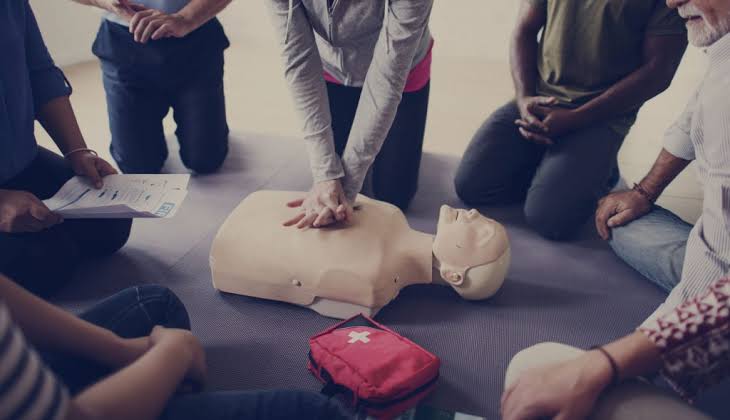What Will I Learn in an Accredited First Aid Course?

Accidents can happen anytime, anywhere. Whether you’re at home, at work, or out in public, knowing how to respond in a medical emergency is an invaluable skill. This is where accredited first aid training comes in. At First Aid Pro, our courses are designed to give you the knowledge and confidence to handle a wide range of situations, from minor injuries to life-threatening emergencies.
But what exactly will you learn when you enroll in a first aid course near me? In this guide, we’ll walk you through the essential skills and techniques taught in a typical first aid training program and explain why getting certified is so crucial.
What is an Accredited First Aid Course?
Definition and Overview of Accredited First Aid Training Courses
An accredited first aid course is a structured training program that meets the national standards set by regulatory bodies such as the Australian Skills Quality Authority (ASQA). These courses are delivered by Registered Training Organisations (RTOs) like First Aid Pro, ensuring that the content and delivery are compliant with current legislation and best practices. The term “accredited” means that upon successful completion, you will receive a nationally recognised certificate, confirming your competence in providing first aid.
Why Choose an Accredited Course Over a Non-Accredited One?
Opting for a recognised course offers many advantages. Firstly, it provides peace of mind that the training is of the highest standard. It also ensures that your skills are recognised across Australia, which can be particularly important for employers who are required to meet legal obligations regarding workplace health and safety. While non-accredited courses might teach basic skills, they do not offer the same level of rigour or certification that an accredited course does.
Core Skills You’ll Learn in an Official First Aid Course
Cardiopulmonary Resuscitation (CPR) Training
One of the most important components of any first aid course is learning how to perform Cardiopulmonary Resuscitation, or CPR training. This technique is crucial for saving lives when someone’s heart or breathing has stopped. In our course, you’ll learn how to correctly administer CPR on both adults and children, as well as the differences in technique for each. CPR involves chest compressions and rescue breaths, and when performed promptly, it can double or even triple the chances of survival.
CPR training is not just theoretical; it involves practical exercises using mannequins to simulate real-life situations. By the end of the session, you’ll have the confidence to act decisively in the event of a cardiac emergency.
How to Treat Common Injuries and Medical Emergencies
Throughout the course, you’ll also learn how to treat a variety of common injuries, including cuts, burns, sprains, and fractures. First Aid Pro courses cover essential first aid skills such as wound cleaning, applying bandages, and immobilising injured limbs. Knowing how to handle these situations effectively can prevent further harm and potentially reduce recovery times.
Additionally, you will learn how to recognise and respond to medical emergencies like strokes, heart attacks, and diabetic complications. Time is critical in these scenarios, and the ability to provide immediate care before professional help arrives can significantly improve the outcome.
Managing Breathing and Circulatory Emergencies
Breathing difficulties and circulatory problems require prompt action. Our first aid course covers how to assist someone experiencing a choking incident, an asthma attack, or anaphylaxis. You’ll become familiar with life-saving devices such as the EpiPen and asthma inhalers. We emphasise the importance of quick decision-making, and our instructors guide you through the correct use of these tools in high-pressure situations.
Advanced Techniques Taught in a First Aid Course
Using Automated External Defibrillators (AEDs)
One of the advanced techniques you’ll learn is how to use an Automated External Defibrillator (AED). AEDs are becoming increasingly available in public spaces, workplaces, and schools. These devices are designed to be user-friendly, and when combined with CPR, they greatly increase the chances of survival for someone experiencing sudden cardiac arrest.
In our first aid course, you’ll be trained in the proper use of AEDs, including how to follow the machine’s prompts and ensure the safety of others while administering a shock. This knowledge is particularly important in workplaces where employees are required to have first aid certifications.
How to Perform the Recovery Position and Maintain Airway Management
The recovery position is a critical part of airway management for someone who is unconscious but still breathing. You’ll learn how to safely position a patient to keep their airway open and prevent choking. First Aid Pro places a strong focus on practical skills, so you’ll get plenty of opportunities to practise placing a person in the recovery position.
Specialised Areas Covered by Accredited First Aid Courses
Remote or Wilderness First Aid
If you work or spend time in remote areas, you may need to learn additional first aid skills tailored to wilderness settings. These include treating injuries like snake bites, heatstroke, and severe allergic reactions when professional medical help is far away. First Aid Pro offers specialised training to ensure you are equipped to handle emergencies in these challenging environments.
First Aid for Children and Babies
Providing first aid to infants and young children requires different techniques and approaches compared to adults. In our childcare first aid courses, we cover essential skills such as paediatric CPR, treating childhood injuries, and managing common paediatric emergencies like fever convulsions or choking. This training is invaluable for parents, childcare workers, and teachers who need to be prepared to act in the event of a medical emergency involving a child.
Assessment and Certification in an Accredited First Aid Course
How is First Aid Training Assessed?
At the end of the course, participants must complete both theoretical and practical assessments. The theory component often includes multiple-choice questions to test your understanding of the material. For the practical part, you’ll need to demonstrate the first aid techniques you’ve learned, such as CPR, wound care, and the use of an AED. This hands-on assessment ensures that you are fully competent and confident in your ability to apply first aid in real-world situations.
What Certification Will I Receive After Completing the Course?
Upon successful completion of the course, you will be awarded a nationally recognised certificate, such as HLTAID011 Provide First Aid or HLTAID009 Provide Cardiopulmonary Resuscitation. A first aid certificate is considered valid for three years, after which you will need to refresh your skills through a recertification course, but CPR needs to be renewed annually. Keeping your certification current is important for ensuring that you’re up-to-date with the latest first aid practices.
Who Should Take an Accredited First Aid Course?
First Aid for the Workplace
First aid is an essential skill for all workplaces, particularly those in high-risk industries such as construction, manufacturing, and hospitality. Employers have a duty of care to ensure that their employees are trained in first aid to meet occupational health and safety requirements. First Aid Pro offers tailored onsite workplace training to ensure that staff are prepared to respond to emergencies effectively.
First Aid for Parents, Teachers, and Caregivers
For parents, teachers, and caregivers, having first aid training is not just beneficial—it’s essential. Children are more susceptible to certain injuries and emergencies, and knowing how to respond can prevent situations from escalating. Specialised first aid training provides parents and childcare professionals with the tools they need to act quickly and confidently in any emergency.
How to Enrol in an Accredited First Aid Course
Finding a Registered Training Organisation (RTO) in Australia
When looking for a first aid course, it’s important to choose a trusted registered training organisation (RTO). First Aid Pro is one such organisation, offering a wide range of nationally recognised CPR & first aid training in Gold coast. We offer flexible training options across various locations, making it easy for you to find a course that fits your schedule and location.
What to Expect During the Course
Our accredited first aid courses combine both theoretical and practical learning, typically delivered over 5.5 hours for a full face-to-face first aid program. You’ll receive practical, face-to-face training from experienced instructors, ensuring you’re fully prepared to handle medical emergencies. Whether you choose an in-person course or one with online components, First Aid Pro provides comprehensive support throughout the learning process.
Frequently Asked Questions (FAQs) About Accredited First Aid Courses
How long does a first aid course take?
Most Provide First Aid courses take between 5 to 6 hours, depending on the delivery format you choose.
Will I learn the basics of a first aid kit?
Yes, in an accredited first aid course, you’ll learn the basics of a first aid kit, including what essential items it should contain and how to use them effectively in emergencies.
Do first aid certifications expire?
Technically no, but to remain current you must refresh your knowledge and skills every three years for first aid and annually for CPR.
Can I do a first aid course online?
Yes, First Aid Pro offers faster and more flexible online training options vis Zoom where you can still demonstrate your First aid and CPR skills in front of a qualified trainer and assessor.
Conclusion
Completing an accredited first aid course is a smart investment in your ability to respond to accidents and medical emergencies, whether at home, in the workplace, or out in public. From CPR to managing breathing emergencies, First Aid Pro equips you with the skills and knowledge to make a real difference when it matters most. Don’t wait—enrol in one of our nationally recognised first aid courses today and gain the confidence to save lives.



